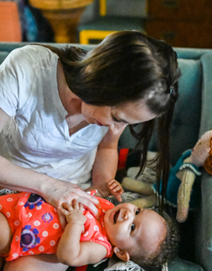Your Newborn Baby

The early days with your new baby can feel overwhelming. Getting to lnow and care for your little one can be a steep learning curve. The National Childbirth Trust has put together these 10 ways to care for your newborn baby:
1. Hold your newborn safely Newborn babies often like to be cuddled and need to be held in a safe way that supports their head. Mums and dads should be encouraged to have skin‑to‑skin contact with their babies as soon as possible after the birth.Your baby might be happy snuggled against your chest, where they can hear your heartbeat. They will also enjoy being cradled or supported in your arms or with their head resting against your shoulder.Some newborn babies like to be swaddled and there is some evidence to suggest swaddling calms infants and helps them sleep.
2. Feeding your baby Newborn babies feed little and often. So you can imagine how feeding your baby will be a major focus. Your baby will probably need to feed at least eight times in 24 hours during the first few weeks. Recognising the the early signs that your baby is hungry might help them to feed more calmly. Feeding your baby frequently can be tiring, especially when it’s through the night. So it’s important to take care of yourself too and rest when you can.
3. Bathing your baby If you’d like support with giving your baby their first wash or bath, a midwife at the hospital should be able to show you how. They’ll also show you how to keep your baby's umbilical cord stump clean and dry until it drops off after about a week. There’s no need to rush into giving your baby a bath straight away and a simple top and tail will do. It’s not good to use bath products, cleansing agents or medicated baby wipes on your newborn. That’s because their skin is sensitive, so simply using water and cotton wool for washing them is enough in the early days.
4. Changing your newborn's nappy Changing your baby’s nappy for the first time is a major milestone. Some parents use disposable and others use washable nappies. But whichever you use, you’ll soon know how to put on a nappy. After all, young babies might need nappy changes about 10 to 12 times each day.
5. Keeping your baby warm Your baby needs to be kept warm, especially outdoors. But it’s also important to make sure they don’t get too hot or overheat. A good rule of thumb is to give your baby one extra layer of clothing than what you’re wearing. For example, if you’re in a t-shirt and jumper, dress them in a vest, sleepsuit and cardigan or jumper. Remember to remove extra clothing when you come in from outside or go into a warm car, bus or train.
6. Newborn baby healthcare It’s always a good idea to ask visitors to wash their hands before holding your newborn baby. Don’t worry, they’ll understand you just want to reduce the risk of your baby getting an infection early on. You’ll also need to ask smokers to smoke outside and to wash their hands thoroughly before holding your little one. You could suggest they wear a jacket while smoking, which they take off before holding your baby. Keep an eye on your baby’s temperature so they don’t get too hot (or too cold). You can feel their chest or back to check their body temperature. If you’re concerned about your newborn baby’s feeding or health, trust your instincts and contact your GP.
7. Baby safety tips If you plan to drive home from a hospital or midwife-led unit after your baby’s birth, you’ll need a suitable car seat. Once you’re home and tiredness is setting in, so too might the coffee habit. Just make sure you don’t have hot drinks or boiling water anywhere near your baby. Take care too when you’re tired not to fall asleep on a sofa or chair with your baby.
8. Newborn baby sleep There are a few rules to learn for putting your baby down to sleep. Always place your baby on their back to sleep and follow safe sleeping guidelines. You’ll also need to put them in the ‘feet to foot’ position in their cot. Some people find it helpful to consider the first three months of their baby’s life as the fourth trimester. The idea is that it’s a transitional period for your baby to adjust to life outside the womb and they need lots of attention to help them through.In the early days, your baby will wake around the clock to feed and to be held and comforted. But don’t worry, this won’t last forever. As your little one’s tummy grows and they learn the difference between day and night, they will eventually feed less often and sleep for longer at a time.
9. Soothing a crying baby To begin with, your newborn baby’s only way of communicating is crying. If your little one is crying it can be helpful to run through a quick checklist:
- Are they hungry or thirsty?
- Do they need a nappy change?
- Are they too hot or too cold?
- Are they tired or overstimulated?
- Could they be ill?
- Do they simply need to be held and comforted?
If your baby is crying continuously, or their cry changes to a high-pitched or an unusual cry, seek medical advice. Excessive crying can be tiring and emotionally challenging so try to remember that there is help available and it’s important to seek support from friends and family, or from a health professional.
10. When to seek medical help Trust your instincts. You know your baby well and will know what usual behaviour is for them. So if you think your baby is seriously ill, even if there are no obvious symptoms, call your GP, NHS 111, or call 999 in a medical emergency. Get medical help immediately if:
- your baby has a high temperature that doesn’t decrease with ibuprofen or paracetamol; or if they have a temperature and they’re under eight weeks old
- they’re crying constantly and inconsolably in a way that doesn’t sound normal for them
- their vomit is green
- your baby turns blue or very pale
- their breathing is quick and difficult, or makes a throaty noise
- they are exceptionally hard to wake up, unusually drowsy or confused
- they have glazed eyes and do not focus on anything
- your child is under eight weeks old not feeding or is reluctant to feed
- your baby’s nappies are more dry than normal.
If you’re very concerned about your baby, take them to accident and emergency or call an ambulance if:
- they’re not breathing
- they won’t wake up
- they have a rash that doesn’t fade when you press a glass tumbler against it
- they’re younger than eight weeks old and you’re extremely concerned
- they have a fit and they’ve never had one before
- they have a severe allergic reaction
- your baby has been seriously injured by someone
Please visit Baby & toddler | Evidenced-based information on babies & toddlers | NCT for more information.
Early Experiences Matter
The quality of a child’s early learning experiences are crucial in supporting the development of a child’s brain. In the first few years of their life, over 1 million neural connections are formed each second. Brain development will never reach this pace again; therefore, it is imperative to support your child’s development from their newborn phase. It is important to remember that each baby develops at their own pace and there is usually nothing to worry about if your baby takes a little longer with some things. If you do however have any concerns, please speak to your health visitor.
What to expect and when
Here is a guide to your baby’s development milestones, remember babies and children develop at their own pace.
2 months

Your 2-month-old is wide-eyed and curious, smiling at faces and engaging with everything around her/him. Babies at this age are social and love to interact. Here is how your little one will be growing, learning and changing during this age.
4 months
Babies at this age love to babble, coo, play and mimic the sounds they hear and movements they see. You’ll start to notice that her/his cries will start to sound different as she/he learns to communicate hunger, frustration, discomfort and sleepiness. Here is some more information about how your 4-month-old may be changing and growing.
as she/he learns to communicate hunger, frustration, discomfort and sleepiness. Here is some more information about how your 4-month-old may be changing and growing.
6 months
At 6 months, your baby will start using sounds to express emotion. She/he may mimic sounds she/he hears, like "ma,”  “da,” “ah,” “oh" and even "no!" Your little one will begin to recognize familiar faces, reach and grasp for toys and will soon be crawling — start preparing your home (and yourself) for a mobile child!
“da,” “ah,” “oh" and even "no!" Your little one will begin to recognize familiar faces, reach and grasp for toys and will soon be crawling — start preparing your home (and yourself) for a mobile child!
9 months
Babies at this age are crawling and can raise themselves to stand, so safety in the home becomes an important issue as your baby's curiosity (and mobility) grows. Your baby now responds to her/his name, loves to cuddle with family members and may show shyness or fear of strangers. Games like peek-a-boo and pat-a-cake are sure to be a big hit with your 9-month-old. As your baby approaches 9-12 months, they will become more vocal as their understanding of emotions develops. These brain connections develop as a result of everyday experiences, which provide their foundations for learning.
Find out more from UNICEF Parenting

